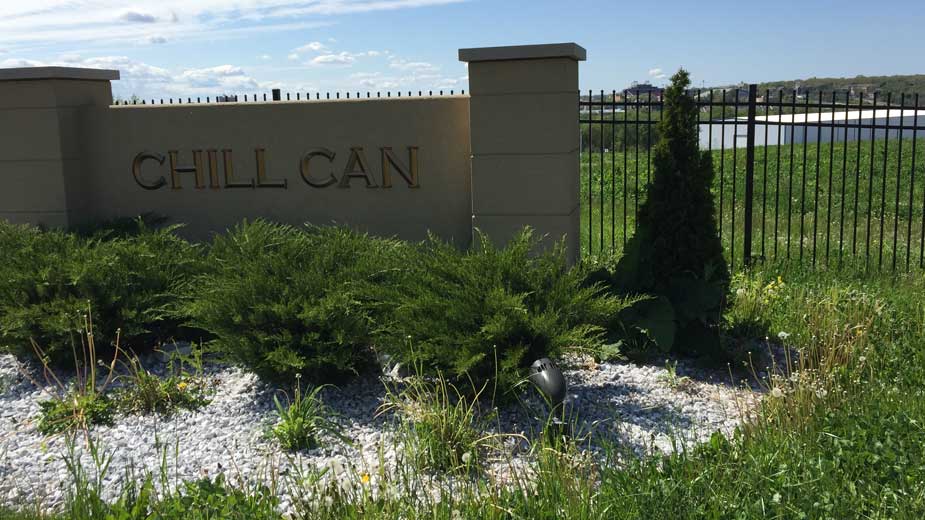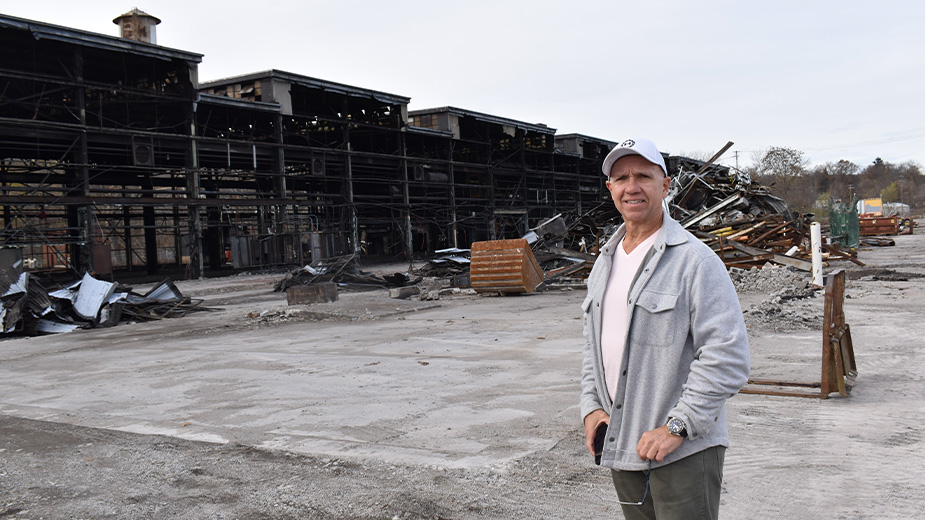Land, Delays Entangle City and Chill-Can Developer
YOUNGSTOWN, Ohio – Half of one building and about one-fifth of a second building constructed at the Chill-Can site on the East Side sit on land still owned by the city, records show.
A tax map of the property obtained from the Mahoning County Auditor shows that the first building completed at the site – considered the complex’s production and bottling building on the east side of Lane Avenue – overlaps with portions of five parcels that were never turned over to the developer, M.J. Joseph Development Co. of Irvine, Calif.
The city-owned parcels account for about one half of the building’s footprint, which measures 35,000 square-feet.
A second 35,000-square-foot building on the west side of Lane extends over one city-owned parcel that accounts for about one-fifth of the structure, according to records.
The matter could complicate an ongoing dispute between the city, Joseph Development Co., and its CEO, Mitchell Joseph, officials say.
“I think it does two things,” said Youngstown Law Director Jeff Limbian. “It does complicate matters because it will take a court to extricate it. On the other hand, it puts us in a good position and demonstrates that you can’t thumb your noses at us.”
In October of 2016, Joseph Co. CEO Mitchell Joseph said that he planned to build a $20 million campus on land on the East Side near where his grandfather’s former bottling business once stood. The complex would be devoted to research and development of the world’s first self-chilling can and other self-chilling technology.
However, the project is woefully behind schedule. More than four years since the project broke ground, just a handful of employees – mostly security – have been hired and not a single can has been produced.
And, according to testimony Joseph gave last August during a hearing held by the Mahoning County Auditor Board of Revision, what construction has been done at the site is more incomplete than it appears.
On March 26, the city notified Joseph Development Co. that it is in violation of two agreements it signed with the city in 2017. The agreements awarded Joseph Development a $1.5 million site development grant and a tax abatement of 75% on new construction there.
Plus, the city spent another $400,000 to buy out and relocate the remaining residents of the 22-acre neighborhood to make way for the project. In late 2017, the Board of Control approved turning 35 parcels it had acquired at the site over to the Joseph Development for the project, but those transfers were never carried out and remain in the city’s possession.
Joseph Co. was to complete construction of three buildings – a warehouse, a bottling facility and a plastics facility – by Oct. 1, 2017. The company also promised to have hired at least 153 people by this time. A third building was constructed late in 2020 but remains unfinished.
Now, the city is threatening legal action that could result in the it clawing back the $1.5 million grant, reclaiming land owned by the Joseph Co. and rescinding the project’s tax breaks.
Joseph owns about 75 parcels at the site, while the city owns around 30, most of it along the site’s periphery.
The city demanded the project be completed within 60 days of Joseph receiving the notice March 26.
Joseph and the city’s attorneys are in discussions as to how to move forward. On Friday, Limbian said that Joseph’s attorney, Brian Kopp, presented a proposal, but declined to provide details.
Meanwhile, it was revealed in August at the tax board hearing
Three years after the developer broke ground in November 2016, the first building was about 80% completed and the second building was just 35% finished, according to testimony before the Mahoning County Auditor Board of Revision.
“Building two is just a shell,” Joseph said during the hearing on Aug. 20, 2020. “There’s no floor yet. That hasn’t been poured because we’re looking with the architect on the drain and also the footers that will be part of the warehouse.”
Joseph said then he had hoped to have the floor in the second building poured and utilities hooked up “in six months.” However, reporters who have monitored the site have noticed little or no activity there this year.
The first building, Joseph told the tax board, is much further along and is near completion. He noted that some equipment was already packaged and delivered, while other improvements were made inside.
First Ward Councilman Julius Oliver said he last toured the building in late 2019, and confirmed there were pieces of equipment wrapped up and against one of the walls. “There were locker rooms, office space and some equipment,” he said.
Documents filed with the auditor’s office show that in February 2020, Joseph filed an appeal disputing the county’s appraisal of $1.529 million on the property, saying that the value of the first building was $750,000.
It was only during the hearing that Joseph discovered that the appraisal was for both buildings, which county appraisers said is in line with Joseph’s estimates.
As such, Joseph withheld paying real estate taxes on the property until the matter was resolved.
On October 9, 2020, the Board of Revision reduced the value of both buildings to a total of $1.213 million, taking into consideration of the unfinished condition of the second building.
Still, according to the auditor’s website, Joseph is delinquent on $12,188.16 in real estate taxes on the property where the buildings stand.
Joseph disputes any delinquency, and said once the issue was resolved at the hearing any back taxes would be consolidated into payments due every tax period.
According to the auditor’s website, Joseph has paid $6,112.90 in real estate taxes thus far, and has no outstanding tax bills on any of the East Side property.
“To date, we have paid two consecutive tax payments on this matter along with our current tax bills and we are not behind whatsoever,” Mitchell Joseph said in an email to The Business Journal. “Nor have we ever been noticed by the tax department for delinquent payments on this matter to date.”
A third building was constructed at the site in October of 2020, but that too remains unfinished.
Copyright 2024 The Business Journal, Youngstown, Ohio.



